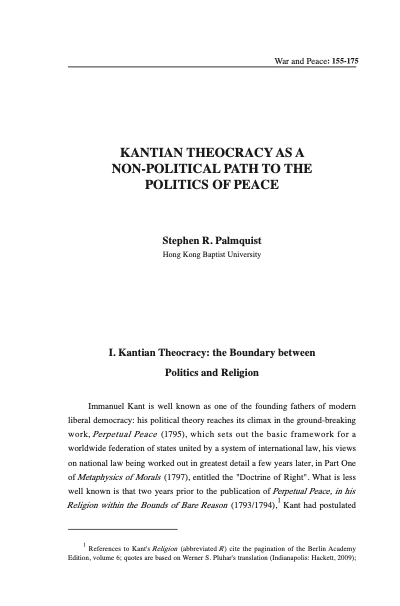KANTIAN THEOCRACY AS A NON-POLITICAL PATH TO THE POLITICS OF PEACE/Stephen R. Palmquist
Stephen R. Palmquist
ABSTRACT
Kant is well known as one of the founding fathers of modern liberal democracy: his political theory reaches its climax in the ground-breaking work, Perpetual Peace (1795), which sets out the basic framework for a world federation of states united by a system of international law. What is less well known is that two years earlier, in his Religion within the Bounds of Bare Reason (1793/1794), Kant had postulated a very different, explicitly religious path to the politics of peace: he presents the idea of an “ethical community” as a necessary requirement for humanity to become “satisfactory to God.” While many recent scholars have noted the importance of Kant’s concept of the ethical community, few recognize the force of his argument that such a community is possible only if it takes the form of a church; as a result, the precise status of his proposal remains unclear and underappreciated. He argues in Division One, Section IV, of Religion’s Third Piece that the idea of this community can become a reality only through a “church” that is characterized by four rational requirements: unity, integrity, freedom, and the changeability of all church rules except these four unchangeable marks. Prior to Section IV, Division One portrays this ethical community as having a political form, yet an essentially nonpolitical matter. Kant compares it with Jewish theocracy, but observes that the latter failed to be an ethical community because it was explicitly political. Whereas traditional theocracy replaces the political state of nature (which conforms to the maxim “might makes right”) with an ethical state of nature (which conforms to the maxim that I call “should makes good”), or attempts to synthesize them, non-coercive theocracy transcends this distinction through a new perspective: it unites humanity in a common vision of a divine legislator whose only law is inward, binding church members together like families, through the law of love. Whereas the legal rights supported by democracy and a system of international law can go a long way to prepare for world peace, Kant’s conviction is that it will be ultimately impossible without support from healthy religion.
撮要
康德是現代自由民主的創建者之一。他的政治理論在其富突破意義作品 Perpetual Peace (1795) 達致高峰。該作品展陳一個由多國組成的世界聯邦基本框 架,這聯邦由一套國際法律系統所連合。在這作品面世前兩年,康德在其知名度略遜的 Religion within the Bounds of Bare Reason (1793 / 1794) 一書,假設一條相當不同的明確宗教路徑,引向和平政治,提出一個「倫理社羣」的理念,作為人類達致「令神滿足」的所需條件。儘管不少新近學者留意到康德的倫理社羣概念的重要,但少宥曉得康德辯說的力量,就是只有採納教會的形式,才可構成這樣一個社羣。因此,康德提議的準確地位依然模糊,並且不容易讓人明白。康德在 Religion within the Bounds of Bare Reason 第三部第四段落第一主段辯說,只有透過具備四種理性條件——連合、一貫、自由,以及所有教會規條可以改變(除了這四個標誌外),倫理社羣的理念才得以實現。在第四段落之前,第一分段勾勒這個倫理社羣具有政治形式,可是,在基本上卻是非政治。康德把這個倫理社羣與猶太的神治,卻察覺後者未能成為倫理政體,蓋因其政治意味明確。傳統的神治以自然的倫理國度(從服筆者所稱的格言「應當令事情變得良善」)取代自然的政治國度(從服「或可令事情正確」格言),或嘗試整合兩者。非強制的神治透過新的向度,超越這區別﹕透過愛的律法,以神的立法者基本遠象,來結合人類。這位神的立法者的唯一法律,就是內聚連結彼此像家庭的教會成員。民主與國際法律系統所支持的合法權利,為準備世界和平,得走漫漫長路。康德的信念卻是,缺乏健康的宗教支持,終究沒可能作此準備。
原載於《建道學刊》46期(2016年7月),頁 155-176。
最新文章
新手牧者研究計劃(三):新手牧者的身心靈狀態 / 盧慧儀
2025 年 11 月 19 日
【教牧退休】好好理財 退而不憂 / 林本利
2025 年 10 月 1 日
【教牧退休】生前身後的管理:平安三寶 / 陸文慧
2025 年 10 月 1 日
編輯精選
[電子書]困境與抉擇:「建道研究中心30週年誌慶」跨學科研討會論文集/廖炳堂、倪步曉主編
2025 年 1 月 2 日
從梧州到長洲:建道神學院125年的挑戰與恩典 / 陳智衡
2023 年 10 月 1 日
微小教會的見證/高銘謙
2023 年 6 月 1 日







